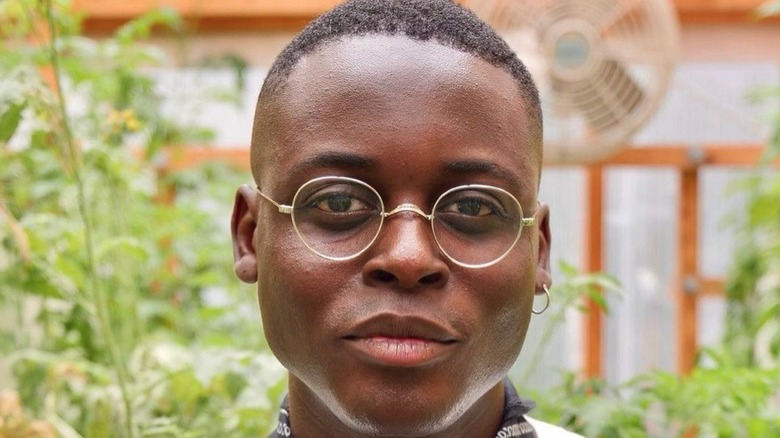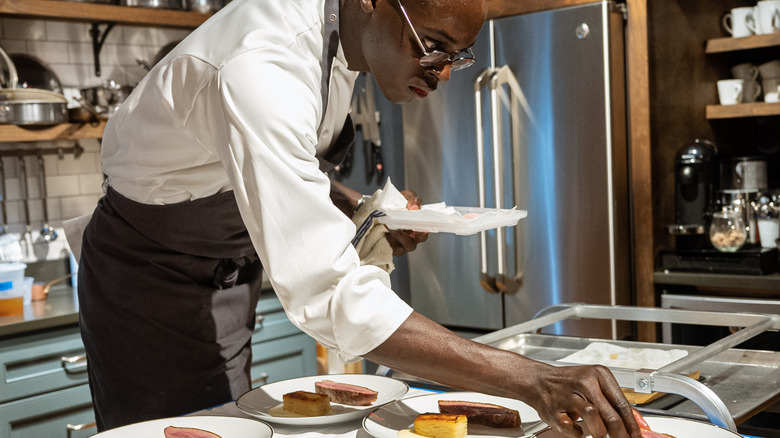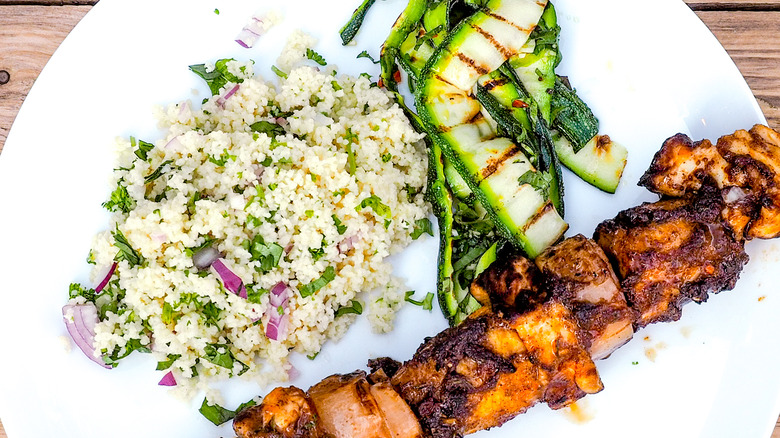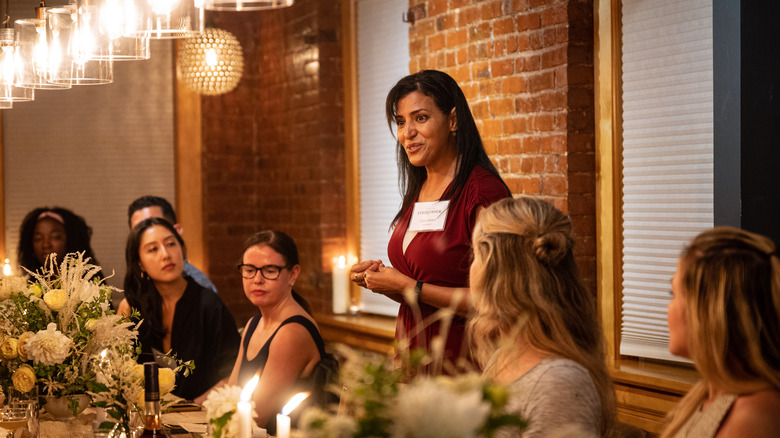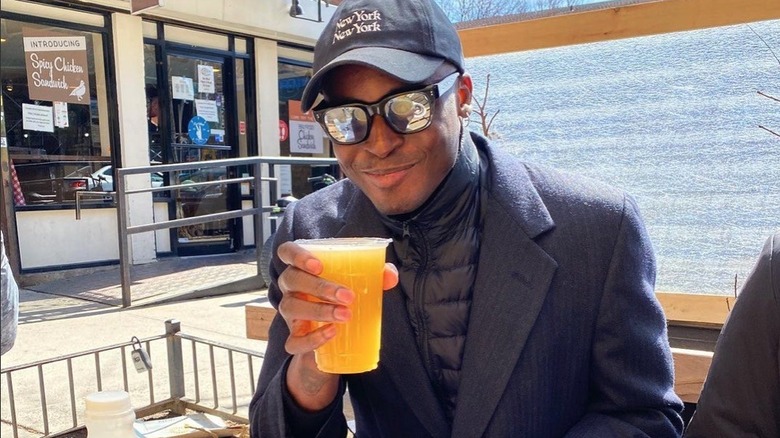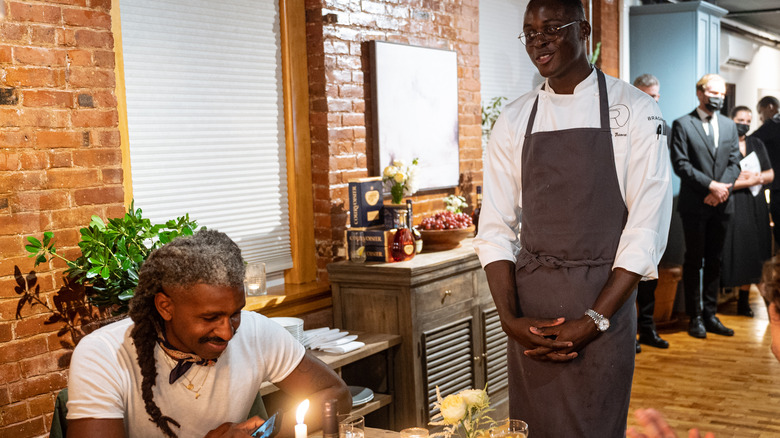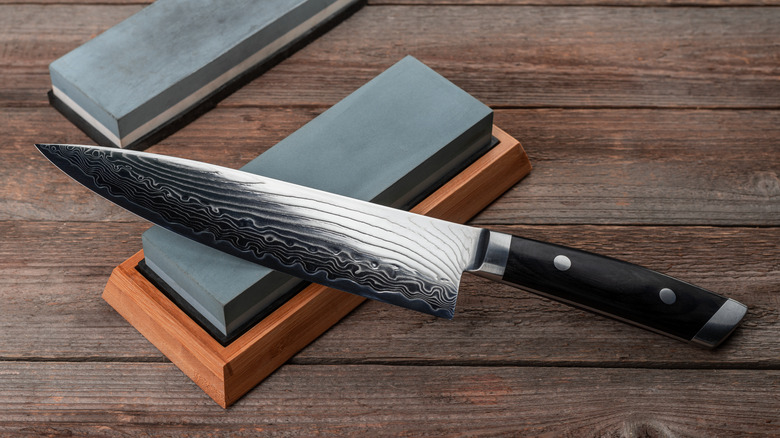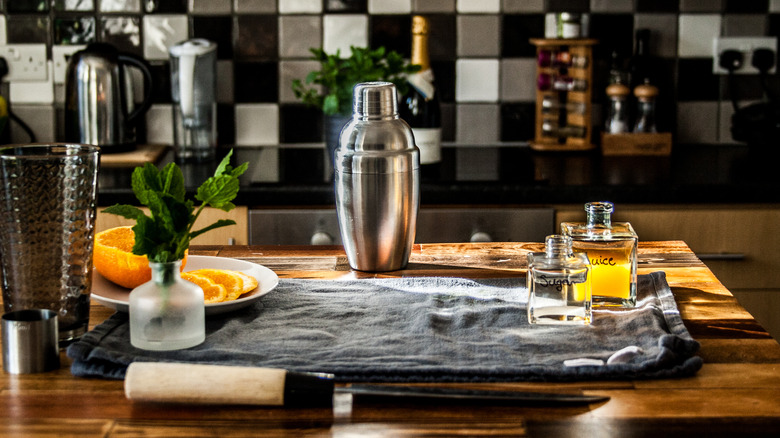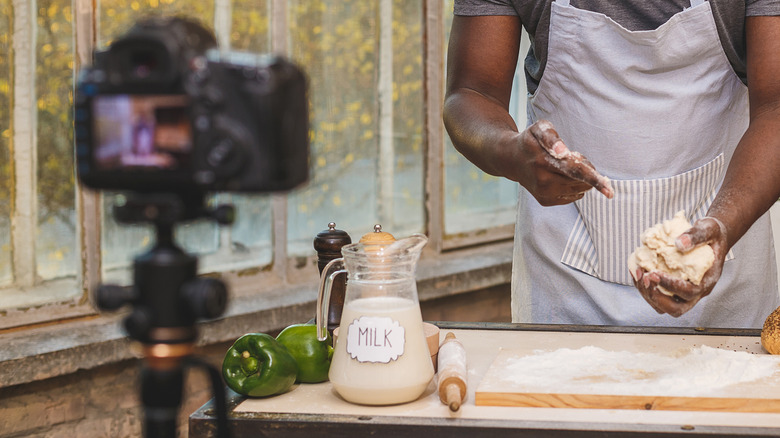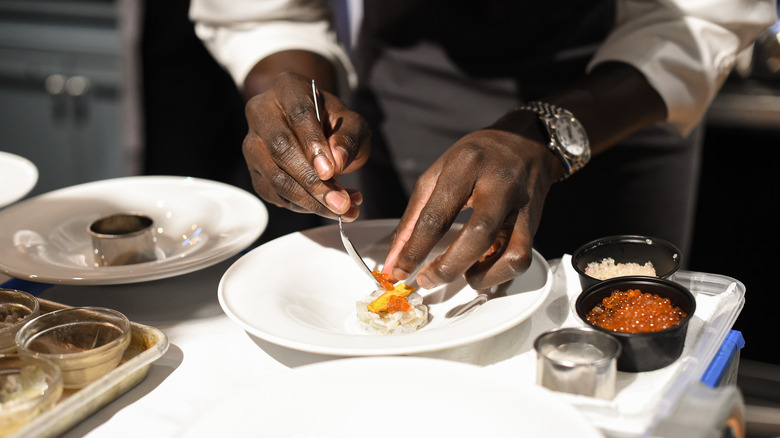Chef Rōze Traore Gets Real About His Love For French And Mexican Cuisines - Exclusive Interview
A conversation with Chef Rōze Traore can leave you with two entirely disparate feelings: one is motivation because when you realize how much this young man has accomplished thus far, you'll experience a surge of inspiration to get after your own goals more. The second, however, is dejection, because as became clear during a recent interview with Mashed, Rōze Traore has already accomplished enough to put many of us to shame, and years before there's a wrinkle or gray hair to be seen on him. This is good news, as he not only travels the world cooking for celebrities, athletes, and dignitaries, but he also does modeling work. Yeah.
Perfect skin and piercing eyes aside, it's the cooking that has earned the chef a name in the world, and that cooking was informed by a youthful passion for working in the kitchen, by a love for the foods of the Ivory Coast — the country of his forebears — and of course by his time training at the world-renowned Le Cordon Bleu cooking school in Paris.
Given the chef's pedigree and his love for French culture and cuisine, it was only logical that the young man was approached by a decidedly venerable brand, one that has about 200 years on Rōze Traore, in fact: Courvoisier. The spirit brand has been around since 1828, yet it manages to remain not only respected but relevant thanks to work with chefs like Traore, a bonafide expert on pairing meals with drinks, and mixologists like Zahra Bates, a "Global Courvoisier Education & Training Manager" and bonafide expert on pairing drinks with meals. Bates joined the conversation between Mashed and the chef, adding her insights both on Courvoisier specifically as well as on great cocktails in general.
A great drink aside, the focus was food, and more often than not, the talk circled back to one foodstuff in particular: butter. Because you really can't have great French food without it — a lot of it, if we're being honest.
Chef Rōze Traore's early days of cooking
Did you grow up cooking? And if not, what interested you in it, and when?
I didn't grow up cooking too much, but my dad used to cook a lot. And so he was just all about introducing us to his culture, his roots, where he was from, and making sure that we knew where we were from. So the best way that he was able to do that was by cooking a lot. He was a fisherman. So every time he would be back home, he would just cook a lot for us. And throughout that experience, I think that's what got me intrigued on how much I love this space, and how much there was for me to learn. And I started to slowly get into the mix, and slowly do what I could in the kitchen at that young age.
What inspired you to go to culinary school? Were you thinking about a couple different avenues in life, or were you, by that age, already knowing that's what you wanted to do?
It wasn't what I knew I wanted to do, but it was one of those things where it's like, "All right, you're done with high school. What are you going to do for your life? What are you going to do for your career?" And first thing that came to mind was food, wanting to know the history behind food, and wanting to know the science behind food, the whys, because that's something that was never really explained through my experience with food, through my dad. You just created a dish, because your mom told you how to make it. And there's no recipes. It's just, "This is how you do it. This is how long it goes on for." But that science part wasn't really specified. And so that's what really intrigued me to going to school.
Was there a specific moment where it became clear that you had a special flare for working in the kitchen, and that this was going to be more than just a hobby, that it was going to become a career?
That happened when I was out of culinary school, and I did my internship at this Michelin restaurant. And then that's where I figured out I actually love this. I actually can [take] this a little further. But of course, I definitely didn't know how far I would be able to take it. You look at it now, and a lot of people that you went to school with are no longer even in the field. I would say a good 85%, to be fair, are no longer in the kitchen. But yeah, I think after that, I just wanted to know more and be surrounded by the best, and work with the best. And that is where I just went down that rabbit hole.
The chef's favorite foods
What is your favorite cuisine to eat? And what is your favorite cuisine to cook, if different?
Yeah, this is a hard one, because I've had the pleasure of just traveling the world. Every time you think you're in love with this cuisine, you fall in love with another one, and you go down that hole. Like for example, I was in Mexico a couple days ago, and just enjoying something as simple as a taco, and you really get to experience everything that they put into it — everything from the quality of the meat, everything from the brazing techniques and the spices. It was just magical, because we all have had a taco, but this was just mind-blowing.
And then of course, I'm biased, because of my French background. I just am also in love with the French cuisine. Everything as far as how prestigious everything is, and how a good amount of butter is in there. And that's my thing. So French, Mexican food. I think at the core of it, when you just want to know the real me, what do I actually, really enjoy? It's just the magic between the French culture [and the] Mexican cuisine.
You grew up in the Pacific Northwest, you trace roots back to Western Africa, and you trained at Le Cordon Bleu: given all of that, is there a type of food you consider your native food, and your comfort food?
Yeah, I would say, for example, being from the Ivory Coast, you pretty much cannot resist that braised fish, fried plantains, and couscous. That to me is always comforting. And when you're talking about on the French side, I'm always in love with a good beef bourguignon. I love the braising techniques. Let's just put it at that. I'm a meat and potato type of guy, at the end of the day. And yeah, I think there's something so magical when you're just building these flavor profiles, and really having them just concentrate and just the taste delicious, [that] is something that I would say is my comfort zone.
Why Zahra Bates loves working with Chef Rōze Traore
When you're working with a chef, like Chef Rōze, how do you design cocktails to compliment the menus the chef has planned?
Zahra Bates: Oh, this has been a magical experience, working with Chef Rōze especially, because sometimes he speaks and it's like he's actually speaking words from my mind. So it's very collaborative. We both have that love of French cuisine, so we definitely have that understanding of what is happening on a plate. But my approach, personally, is really looking at that aspect of balance and honoring the dish. So I really like to think about the fact that yes, Courvoisier is a French house, with that deep-rooted French heritage, which means having a lot of butter, as the chef says. And those French techniques that are so much a part of it are always going to be that thing that inspires me and draws me back. And so that is something, especially with Chef Rōze, we have that natural affinity, and that connection, too.
What do you wish people knew more about Courvoisier, and are there any misconceptions about the brand that you wish to dispel?
One, I think because Courvoisier has been around since 1828, and it has that couple hundred years of history, I wish people would stay [open-minded]. It has always been this elevated thought of like, "Okay, well, it's cognac. This is very prestigious cognac, and it's super luxurious." Yes, but it's not stuffy. And that's the thing, it's very approachable. It is a lot of fun, especially being able to do stuff with Chef Rōze, being able to have conversations through culinary history, in a way, and having them play together. I think that I would love people to take away the fact that you can have a lot more fun with Courvoisier.
The many facets of chef Rōze Traore
You wear lots of different hats: You do modeling work, you do media, you do cooking on camera, you're professionally trained. How do you define yourself? Primarily as a chef, or is it all inseparable?
I think it's definitely all inseparable, simply because all of these worlds come in together and complement each other, to some degree. And they've essentially made me the person that I am now. Simply by culinary world, you're always reaching for perfection. Fashion, you're always reaching for perfection. And the fact that you know that it's never good enough, but you're always going to deliver the best, is something that I've been able to take on between both worlds.
And not only that, it's just always been my mission to show people that there's other outlets for you to still be considered a chef, other than just that traditional, just being in the kitchen the whole time. There's different personas, different boundaries that you could continue to push and excel in, other than just one space. And so that's been my approach with my whole career. One of my favorite things is, for example, pretty much teaming up with Courvoisier as their culinary ambassador to support the brand, to bring elevated French fine dining to consumers in the U.S. The rich, new "Welcome to Our Kitchen" series is something that's been exciting because it's another way for me to express myself. It's another way for me to show people the cooking is part of it, but actually being able to pair it with something as high-end as Courvoisier, that's also been fun.
Chef Rōze Traore on the rise of African American chefs
Black chefs in this country are finally getting due recognition right now — what do you think has brought on the change in attitudes, and what does a new awareness of black cooking mean for the future of the culinary scene?
I think it's something that, look, it's not like we haven't been around. I think it's the fact that we're just continuing to project our voice, we're continuing to express ourselves in a new manner, as far as who we really are. And when you talk about having that spotlight, it's being able to also open doors for the generation behind me. It's always been interesting for me to put that image out there. It's like, just because you're an African American chef does not mean you're always tied to that Southern touch. So it's just [because of] small stereotypical roles like that, that I personally try to make my voice heard. My background is specifically from the French side. That's how I've been able to express myself. And yeah, I feel like people just need to continue to dive in, continue to listen and enjoy different types of cuisine from that same race, if you would say.
Chef Rōze Traore offers advice for home cooks
What are common mistakes that you see home chefs making, and what is some of your advice for the home cook looking to improve their culinary skills?
I would say definitely don't overthink. There's a lot of overthinking that happens when you're in the kitchen. There's a lot of being afraid to just learn about an ingredient, and really create something out of it. My whole mission has been making it approachable, making it to where it's very easy for you to understand and learn these techniques that I've learned throughout the years. And so I think the most common thing is being afraid to dive in when you're in the kitchen, and learning to have a little more patience and understanding your ingredients, as they're talking to you. And yeah, I mean, that's pretty much what I would say about that portion.
Do you have any kitchen gadgets that you can't live without?
I mean, I love my tweezers. I love my knife, obviously. Yeah, I would say those are the top two right there.
And then what about a couple of ingredients, whether they are as simple as butter and salt, or is there any sort of X-factor, that you try to use in your cooking often?
I would say definitely some butter, definitely some salt. And I love black truffle. We're in mushroom season as well. And so those are the routes that I like to take.
Zahra Bates on making cocktails at home
What are a couple of your tips for people who want to make the best cocktails at home?
Zahra Bates: I always say start simple. Pick one cocktail that has very few ingredients, and then master that one cocktail. Because when you're having friends over, or you just want to sit and relax, keeping it simple is a great start. But once you get really good at making that one cocktail in that classic way, then you can start doing your take and your twist on it. And that's what, when your friends come over, what they really want. They want to connect with you and hear your side of what this cocktail means. I think that that's the best advice that I can give. Do something classic first, and then put your twist on it.
What are a couple of the ingredients that people need to have on hand? Be it bitters, simple syrup, what are a couple of the ingredients you think any home bar needs, and a couple of tools?
Obviously, Courvoisier! The tools, I always say have at least your shakers and a mixing glass. That way, you can do two different styles. And that will cover just about everything for tools. But having your Courvoisier, which is super versatile, and have one liqueur that can do a lot of different things. So something that's not super heavy, but something also that's not super light. So something that can cover a lot of different things, maybe an orange liqueur, because it can draw out lots of different notes from different places.
Simple syrup is the easiest thing that you can make. It's just equal part sugar and water. There's a reason why it's called simple syrup, so that's something that you're already going to have. And then bitters is where you can put your flare, or any kind of fresh fruit, or something like that, so you can do a garnish. Keeping it as simple as possible, because once you start building out that classic, you can slowly start building up your home bar. And because you've decided what you like, then you can start stretching out and curating your own home bar.
Rōze Traore talks cooking on camera and other celebrity chefs
What are the challenges of cooking with the camera on you, and would you prefer to work in the kitchen off-screen?
Yeah, I've always actually enjoyed being in front of the camera, and that's where that fashion side has helped me get out of my comfort zone, because there's a lot of camera work happening there. I feel comfortable being on camera, cooking on camera. It's my way to just have the audience be more engaged in what I'm doing, and actually see the process within my recipes, or within my demonstrations. And as far as it being challenging, it definitely can be, because you really have to show that personality for people to really be able to feel it. You got to continue to stay on, if you would say, and keep that momentum as high as when you started. I think it's more into training and more into doing a good amount of videos, for you to finally get a hang of it.
Who are a few of the notable chefs working today who you admire and that inspire you, and who you'd like to work with?
I think you have René at Noma that's been crushing it for the past few years. You have Éric Ripert that not only shows you that culinary style, but also shows you the mental health aspect, pretty much showing that balance. He's all about having balance in the kitchen and outside of the kitchen. I think that's something that a lot of chefs aren't demonstrating, and a lot of chefs want to continue to see. And so it's always good to see that. Daniel's a good friend from EMP, and I've always loved his energy and how he's been able to do his part for the community, and also build a team of amazing chefs.
Chef Rōze Traore's favorite thing to cook
Do you have a single favorite dish to prepare?
I definitely do. My favorite dish is [any dish I make] with my process. For example, when I work with a brand to curate the menu, I make sure that the flavors are balanced in each of the dishes. And for example, the classic representation of luxurious French cuisine, that features something like my duck dish, is something that I'm obsessed with. You have your duck jus that's also steeped with some truffles. You have your pomme puree and some vegetables. It's the silkiest potato that you could taste, just because of that whole process.
And take, for example, a medium-rare duck, based with some butter, some herbs. That's something that was paired actually with a cocktail under my name, which is Rōze in Bloom cocktail. So that's kind of like what I was talking about in the beginning, you have a great dish, and to have something to drink that's also amazing is always a fun part, like the Courvoisier VSOP.
Follow Chef Rōze Traore on Instagram and be sure to check out his collaboration with Courvoisier.
